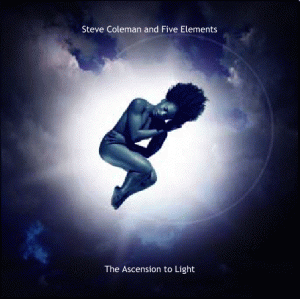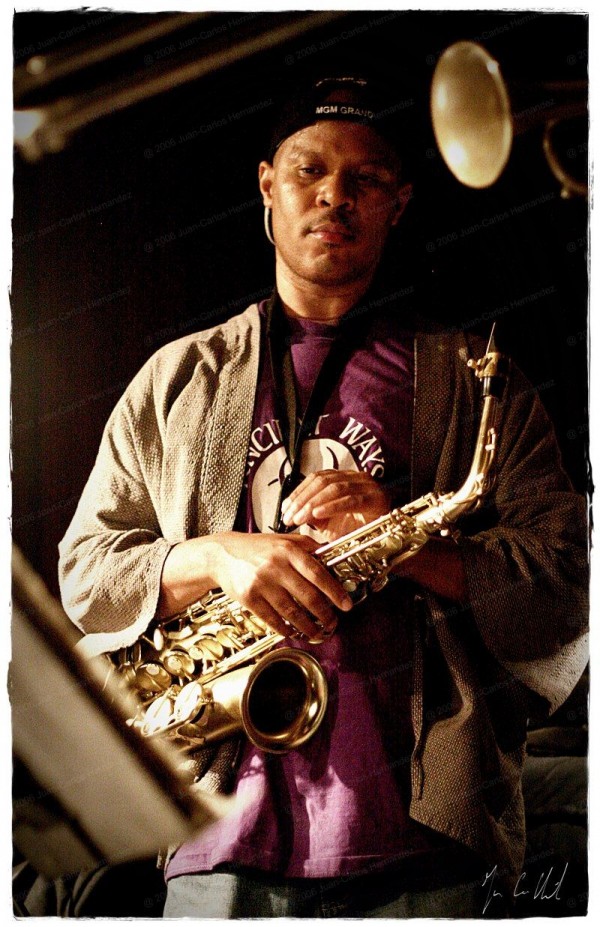BY ZIVIT SHLANK Saxophonist, improviser and composer Steve Coleman is reticent to call himself a jazz musician because of preconceptions. It’s probably best to just call him a musical expressionist. Originally from Chicago, Coleman’s early explorations stemmed from his dad’s love of Charlie Parker. He gained foundational insight early on studying Windy City legends Bunky Green and Von Freeman at play. From there, it was onto New York in 1978 and that’s where the real work began. Coleman as an early, foundational member of the collective MBase, through countless collaborations and his most prolific vehicle, Five Elements, has been consistently challenging and expanding our perceptions of sound. Armed with a fierce intellect and insatiable curiosity, for Coleman, music has always been about communication: language that can be both universal and personalized to reflect his individuality. Coleman’s music is a beguiling combination that can be as perplexing as it is revelatory. For Coleman, the pursuit of knowledge through composition, performance and improvisation has been going on for three decades and shows no signs of stopping any time soon. Tonight Ars Nova brings Coleman and Five Elements to Johnny Brendas. In the midst of a globetrotting tour, Phawker recently got on the horn with Steve from Geneva.
PHAWKER: With a band name like Five Elements, my immediate thoughts were of air, earth, fire, water and something else that could be interchangeable. Those are all certainly represented, but no doubt there’s more to it. What system or philosophy inspired the name and ultimately the direction of the band?
STEVE COLEMAN: There are two traditions of the elements. There’s the Western that extends from Egypt, Ancient Greece, through Europe and that lineage. Those are the four elements that you describe, and sometimes they include a fifth element called Aether. Around 1979 when I was forming the group, I was exploring a lot of Eastern philosophy and so that was the main thing that I was drawing on. The five elements that I’m referring to actually come out of the Far East called Wu Xing. Their tradition stems from Taoism and Yin Yang theories. Although that tradition does serve a similar function and does have three elements that tie into the Western tradition like fire, earth and water, the Chinese also have metal and wood. Believe it or not, it was only in recent years that I’ve really explored it more deeply. In the beginning, it was more of an intuitive thing and something I didn’t know a whole lot about it other than watching movies. I was a big Kung-Fu addict when I was younger and when I started to play music, the curiosity and feeling for that stuff as a kid really influenced me later on. It all had to do with transformation, the changing of one state to another and I wanted to create music that followed that same kind of premise.
PHAWKER: Music for you has always been a very visceral experience. You’ve explored all kinds in various, cultural settings. What other elements  are you attempting to express in your current musical output?
are you attempting to express in your current musical output?
STEVE COLEMAN: Over the years philosophically, I’ve expanded to check out things from everywhere. In terms of the physical way the music moves, it’s definitely more of a West African influence. Over the last 15 years or so, the music I’ve been writing has derived inspiration from nature. This is certainly not new; there are plenty of musicians that have been influenced and inspired by nature, and then tried to express that through sound and music. When you do something like this, quite naturally you try to strive for a more individual sound because there is no one way you can describe nature. It could be clouds, insects, mountains, the human body and certain processes, the solar system whatever you’re into, if you try to express that in sound, there are many ways you can go because some of these things in their natural form don’t produce sound. You’re trying to use sound as a language to express that. So you might come up with things that may be a bit strange to some people. A lot of music that we find commonplace today, was originally created with that inspiration in mind. People such as Johannes Sebastian Bach and John Coltrane who are now household names, back in their time, it may not have been commonly known that they were trying to incorporate that beauty into their music. Every year, I take a sabbatical, usually to Brazil. On this most recent trip, I was doing more of an internal search, but not just spiritually with meditation, but also structurally. Most what I’ve been researching in nature has been outside of myself, but now I’m looking inside and asking ‘How does the mind, the heart, and the body work? What are all the connections?’. So a lot of the music I’ve been and am currently doing stems from that. Nature: That’s been my biggest motivation.
PHAWKER: With all that being said, what are your feelings about the recording process? Do you think with each one, you come that much closer to capturing what it is you seek?
STEVE COLEMAN: To me, recordings are like snapshots of a moment. So say someone takes a picture of you walking down the street today. Then the next day they take another and the next day and so on. People will look at the pictures and say ‘Well, this one looks like Steve’ or ‘This one doesn’t really look like Steve, he’s got a funny expression on his face’ or ‘This is you. This one really captured you perfectly’. Different people have different impressions of what you are or what are typically your expressions, ya know? Everyone has a different impression of that. It’s a frame of where you are in a particular moment at a particular time. For me, it’s never a project that reflects on a specific event or person or whatever. It’s more like ‘Well, this is where we were at that moment, and this recording documented that’. However, you can only do so many recordings. If only we could do one every week or a series. We do one every 6 or 9 months, so it’s spaced out. Sometimes I do go for a concept recording. For me Marvin Gaye’s What’s Going On? or John Coltrane’s A Love Supreme are examples; the whole album has a story behind it and a stream that’s running through it. That’s something I do try to create; a theme that’s connecting all the chapters and not just jumping around. I try to think of the album as a whole work rather than each individual track. Despite all that, it’s still a snapshot of that moment. If we were to do it again 5 months later, even if it’s with the same musicians, it’s still going to be a different vibe and approach to the music. So the focus on nature and this internal look into my own nature, that will be the theme of the next recording because that’s what’s going on right now.
Steve Coleman & Five Elements perform tonight at Johnny Brendas

